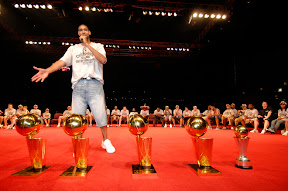After asking aloud to myself if the Spurs were going to be any kind of a player in free-agency earlier today, it would only seem fitting that Richard Jefferson would decide to opt out of a 15.2 million-dollar contract. Suffice it to say, I saw this coming a mile away -- and if you believe that I'd love to sell you your next... anything, really.
Whether this turns out to be a great move on Jefferson's behalf or as poor of a decision as it would seem -- opting out of a final year that would've paid him around two-times his current worth -- is neither here nor there as it pertains to a Spurs fan. So rather than get bogged down in the inconsequential, I think it'd be wise to address what this means. What exactly are the implications and ramifications for the Spurs?
How much money does this save the Spurs?
Had Jefferson exercised his option, the Spurs were looking to be in the neighborhood of $10 million over the luxury tax. Meaning they'd be paying two dollars for every one dollar over the threshold. So with him opting out, the Spurs are likely to now spend up to the threshold without exceeding it. With Jefferson's decision to opt out, Peter Holt's bottom line just improved by $25 million, should the Spurs stay under the tax -- the Spurs were $10 million over the tax, which translates to $20 million (double on every dollar over), and the Spurs would now be in line to collect $5 million in luxury-tax distribution in July, 2011 by simply being under the threshold.
Could Jefferson be re-signed? If so, is it possible that $32-40 million is a better bargain than $15.2 million?




